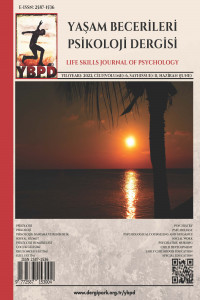LIFE SKILL DIMENSION BASED ON UNIFIED SPORTS SOCCER PROGRAM IN PHYSICAL EDUCATION OF INTELLECTUAL DISABILITY
Intellectual Disability, Life Skill
LIFE SKILL DIMENSION BASED ON UNIFIED SPORTS SOCCER PROGRAM IN PHYSICAL EDUCATION OF INTELLECTUAL DISABILITY
___
- Alruwaih, M.E. (2015). Effects of soccer unified program on adaptive behavioral for children with Intellectual Disability. Ovidius University Annals, Physical Education, and Sport/Science, Movement and Health Series, 15(2 Suppl.), 436-441.
- American Psychiatric Association. (2013). Diagnostic and statistical manual of mental disorders (DSM-5). American Psychiatric Pub.
- Bialik, M., Bogan, M., Fadel, C., & Horvathova, M. (2015). Character education for the 21st century: What should students learn. Boston, Massachusetts: Center for Curriculum Redesign.
- Bota, A., Teodorescu, S., & Şerbănoiu, S. (2014). Unified Sports-a social inclusion factor in school communities for young people with intellectual disabilities. Procedia-Social and Behavioral Sciences, 117, 21-26.
- Burhaein, E. (2017). Aktivitas Fisik Olahraga untuk Pertumbuhan dan Perkembangan Siswa SD. Indonesian Journal of Primary Education, 1(1), 51-58.
- Burhaein, E. (2017). Aktivitas permainan tradisional berbasis neurosainslearning sebagai pendidikan karakter bagi anak tunalaras. Jurnal SPORTIF: Jurnal Penelitian Pembelajaran, 3(1), 55-68.
- Del Valle, P., Kelley, S.L., & Seoanes, J.E. (2001). The “oppositional defiant” and “conduct disorder” child: A brief review of etiology, assessment, and treatment. Behavioral Development Bulletin, 10(1), 36-41.
- Gabe, R.T. (2008). Gejala Arsitektur Sekolah. Universitas Indonesia, Fakultas Teknik, Jakarta, (Skripsi).
- Kauffman, J.M & Hallahan, D.P. (2011). An introduction: Into exceptional learners special educational. Boston: Allyn & Bacon.
- Himberg, C., Hutchinson, G., & Roussell, J.M. (2003). Teaching secondary physical education: Preparing adolescents to be active for life. Champaign, IL: Human Kinetics.
- Kim, S.Y., & Yun, J. (2009). Determining daily physical activity levels of youth with developmental disabilities: days of monitoring required? Adapted Physical Activity Quarterly, 26(3), 220-235.
- Mumpuniarti. (2007). Pembelajaran akademik bagi tunagrahita. Yogyakarta: FIP UNY.
- Ogaora, C. (2013). Special Olympics Washington: Unified Soccer. SOI: United States America.
- Özer, D., Baran, F., Aktop, A., Nalbant, S., Ağlamış, E., & Hutzler, Y. (2012). Effects of a Special Olympics Unified Sports soccer program on psycho-social attributes of youth with and without Intellectual Disability. Research in Developmental Disabilities, 33(1), 229-239.
- Rector, A. (2013). Special Olympics Unified sports: A student’s guide. Ed. 2. Arizona USA: Special Olympics.
- Schunk, D.H. (2012). Learning theories an educational perspective. Sixth edition. Pearson.
- Wilski, M., Nadolska, A., Dowling, S., Mcconkey, R., & Hassan, D. (2012). Personal development of participants in Special Olympics unified sports teams. Human Movement, 13(3), 271-279.
- ISSN: 2587-1536
- Başlangıç: 2017
- Yayıncı: Muhammed YILDIZ
Diajeng Tyas Pinru PHYTANZA, Erick BURHAEİN, - SUKOCO, Wisnu Satria GHAUTAMA
İşyerinde Deneyimlenen Eğlencenin Pozitif Bireysel ve Örgütsel Çıktılara Etkisi
Duygusal Ağlamanın Bilmecesi: Ne Zaman ve Neden Ağlarız?
Esra Nihan BRİDGE, Nesrin DUMAN
Tinnitus ile Depresyon Arasındaki İlişkinin İncelenmesi
Görgü Tanığı Belleği Araştırmaları ve Yasal Uygulamalar: Tarihsel Bir Bakış
